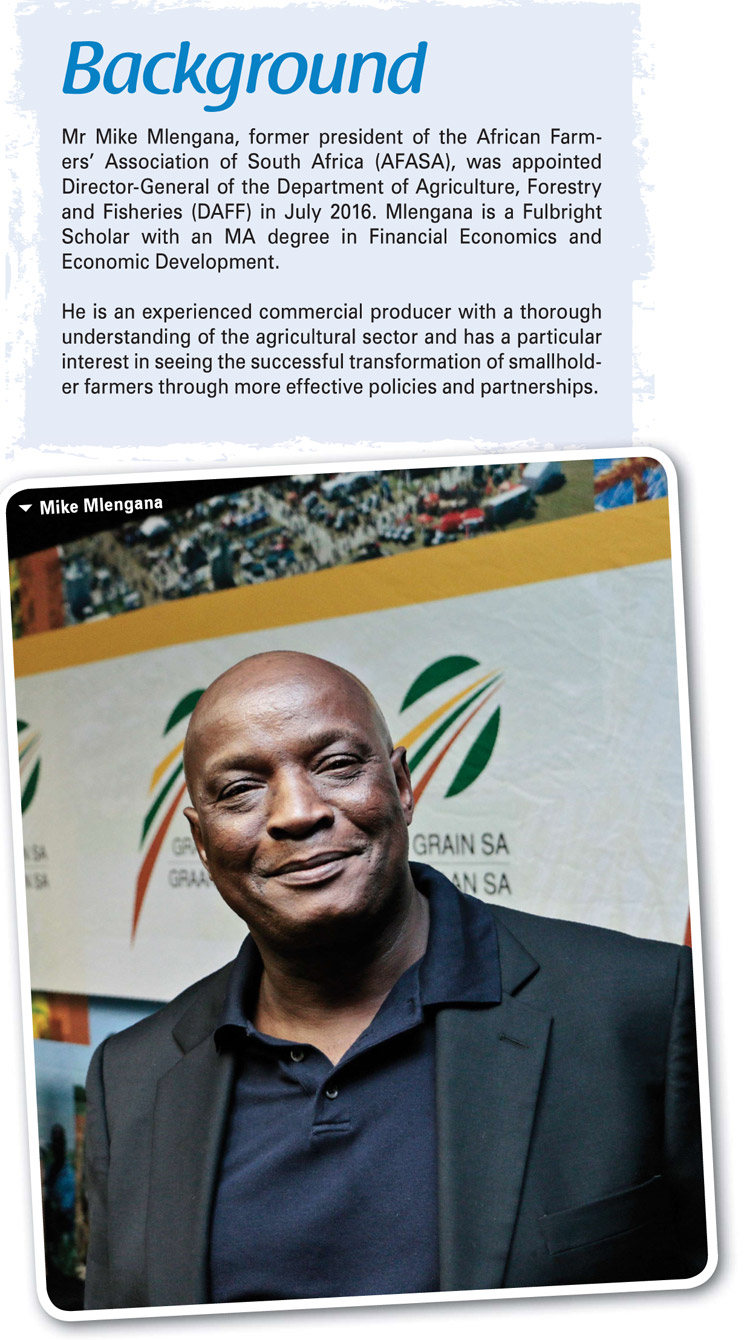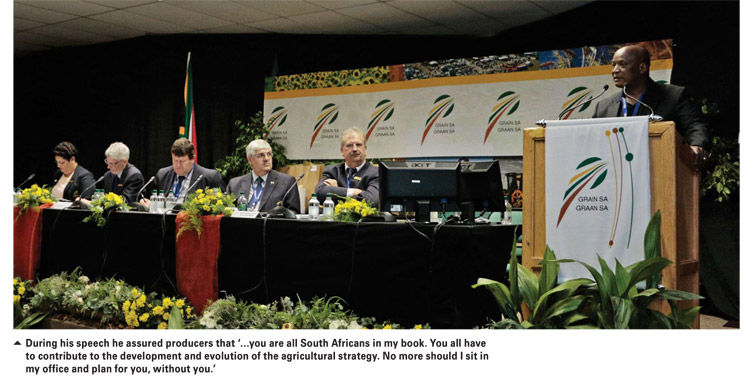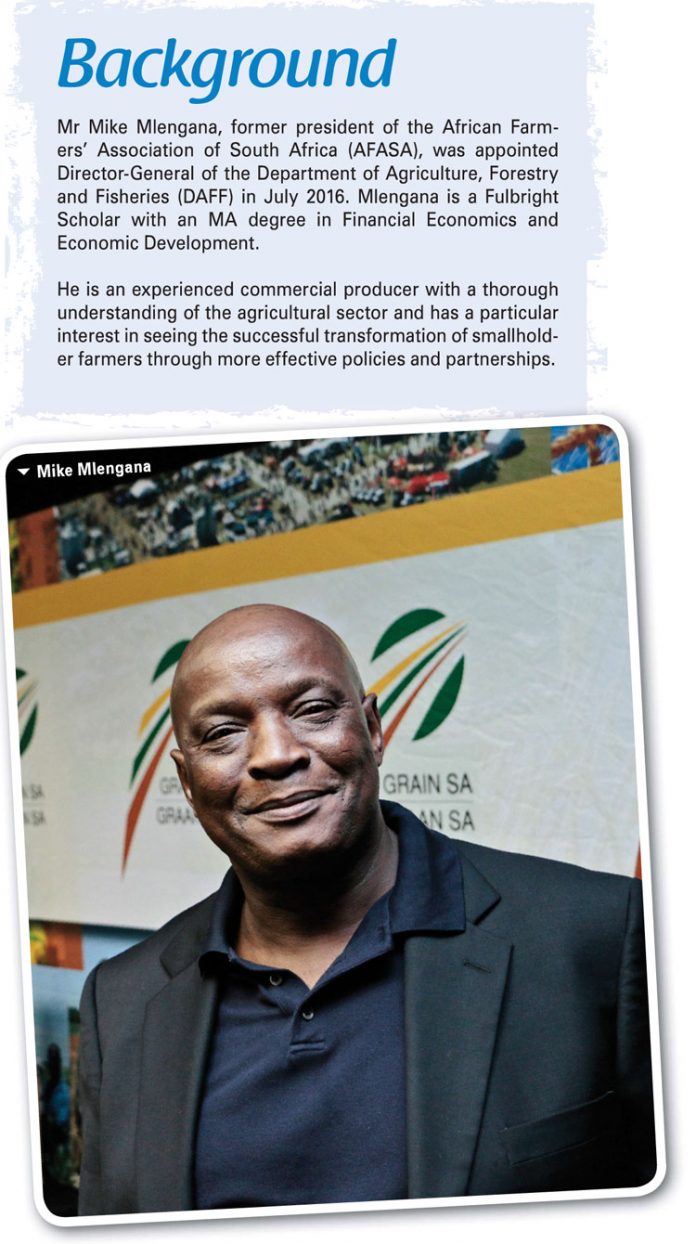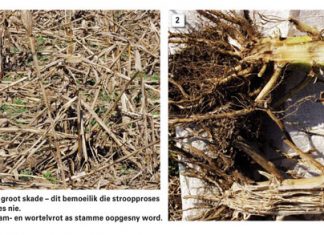April 2017
JENNY MATHEWS, SA Graan/Grain contributor
Mr Mike Mlengana’s message was inspired: Firstly by his testimony that his Christian faith is very important to him. He shared his personal encounter with God after an experience which found him in a coma for more than 17 days, even being pronounced dead. He says, ‘In the second chance I have, I live to serve.’
Secondly, Mlengana referred to a successful partnership he has with another commercial producer, saying it is not one of a ‘previously disadvantaged farmer’ with a ‘commercial producer’, but rather an equal partnership which has enhanced his understanding of the depth of love possible between two human beings.
This relationship which continues today, has convinced him that partnerships must form the foundation of new policy: ‘We can partner guys. We can partner as equals.’
Finally Mlengana leaves his listener with a strong sense of his passion for the agricultural sector. It is passion which drives him and at the same time he expects passion to be the driving force in the heart of every land reform beneficiary as well as every other stakeholder in the sector that is seeking solutions towards more successful land transformation.
He immediately set out to establish the root of fundamental flaws like:
- Why is the sector filled with so much uncertainty?
- Why has it been so difficult for producers to get in touch with officials?
- Why, where assistance is being given to a farming enterprise, are the inputs delivered so late in the season?
His early conversations with agri-sector leaders have seen them agree that the policies designed for the agricultural sector will be inclusive. No-one should progress at the expense of another. Mlengana is unapologetic about the fundamental driver for the agricultural sector: ‘From a policy perspective we must understand that we are correcting the difference that was created before.’
Land transformation must happen, but it has been impeded by a lack of commercial strategy in the sector. He believes previous strategies were too narrow, focussed in developing smallholder farmers and costing huge amounts of money, to very little effect. He has also despaired over projects like Comprehensive Agricultural Support Programme (CASP) where at least R9 billion was spent, but cannot be accounted for.
Mlengana dismissed past efforts saying there was little to no lasting impact on the lives and enterprises of the beneficiaries. He acknowledged this happened because people were appointed to posts on the basis of political alignment rather than skill, which resulted in ‘devastating chaos’.
The Director-General is apparently a man who prefers to look for solutions. He is convinced that it is organisations like Grain SA and producers themselves who will make transformation work – if they can unify and develop a common vision, common values and common goals.
Unity and a single-minded voice from producers, who all face the same problems, will make the difference when it speaks about challenges. Also, it is only when the sector maps its own road ahead and owns the successes and the failures that transformation will progress successfully. There has been too much pushing of projects and programmes that are irrelevant to the sector.
He assured Congress this is changed, ‘I want to assure you that you are all South Africans in my book. You all have to contribute to the development and evolution of the agricultural strategy. No more should I sit in my office and plan for you, without you.’
The danger about a lack of unity is, it creates opportunity for apartheid to be blamed repeatedly for failed land reform, and it allows incorrect perceptions about producers to prevail. So Mlengana also requested the sector to allow the good news to surface more, asserting it’s time to end the negative perceptions.
He recognised the contributions made by producers to villages, schools and their communities, ‘You guys have done some fundamental good things but you fail to highlight them and show government you are a partner in transformation,’ he said.
Mlengana believes a strengthened value chain will strengthen the sector. He blamed the lack of integration for allowing ‘forces from outside’ to create policy. He encourages producers and their organisations to work together to create structures that allow for partnerships. He assured Congress that future recapitalisation programmes will depend on partnerships between commercial producers and black producers and future monies will be invested where there are returns.
Mlengana clearly ‘feels’ the tragedy of failed reform and is deeply distressed by the sight of once productive farms now lying fallow, ‘When you look at them you feel like hiding yourself.’ He is determined that continued focus on recapitalisation will see a shift to enterprise productivity and he will only consider ‘bankable business plans’.
He requested that the sector adopts a proactive approach to transformation. He believes that smallholders need the commercial producers, but producers also need the smallholders, because government policy will be more favourable in the arenas where these partnerships exist.
Transformation is not only training, but equalising; it is unification and mutual acceptance. He assured of a more considered selection process for land beneficiaries: Farms will not be given or sold randomly and ‘non-farmers’ will be eliminated. A producer is born with a passion to farm – no education replaces this.
Mlengana highlighted government’s Vision 2030 (National Development Plan) which aims to boost agricultural output and create up to 1 million jobs. The New Growth Path targets opportunities for 300 000 smallholders plus 145 000 jobs in agro-processing by 2020. Mlengana intends to see increased expertise within relevant departments and greater accessibility, ‘My office is open to you, bring ideas.’
No strategies should be developed at local level without the involvement of agricultural sector stakeholders. His ideal is to have business plans in place which talk to government objectives and are measurable and inclusive.
Agriculture needs to contribute to the economy. To this end there is a fresh focus on building trade relations with countries like China, India, Singapore, Vietnam and other African countries, seeking out markets and growing expertise.
He also assured delegates that his department aims to partner with producers towards realising potential, increasing food security and further empowering smallholder farmers towards full commercial status. He has requested Minister Zokwane to give urgent attention to the issue of land ownership which is presently creating instability and he encouraged producers not to be afraid and to trust the Constitution.
In his response to Mlengana, Grain SA Chairperson Mr Jaco Minnaar expressed appreciation for the open door policy and recognition that producers need to be included in policy planning. He added that this same attitude is not the case in some departments below him. Agriculture can contribute significantly to the economy, but we need support through stable policy to do so – and to fast-track transformation in the sector.

Publication: April 2017
Section: Grain SA


















